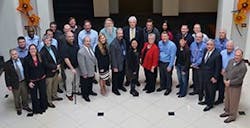NSF International and ASHRAE Sign Agreement to Advance Knowledge of Building Water Health
ANN ARBOR, MI and ATLANTA, GA, JULY 12, 2016 -- Global public health organization NSF International and ASHRAE have signed a memorandum of understanding (MOU) dedicated to protecting public health by establishing safe management practices for building water systems. These systems include cooling towers, air conditioning units for large buildings, hot tubs, large complex water systems (in hotels, hospitals, cruise ships and institutions) and decorative fountains, which can be attributed to public health concerns such as Legionella.
Under the terms of the MOU, NSF International will provide its 70-plus years of water industry expertise and ASHRAE will leverage its building systems expertise to jointly develop NSF 444: Prevention of Injury and Disease Associated with Building Water Systems. This new standard will address concerns such as legionellosis, which according to the CDC is on the rise. The CDC estimates that between 8,000 and 18,000 people are hospitalized with Legionnaires' disease in the United States each year, with more than 4,500 cases reported in 2014.
Water quality often degrades once water enters buildings, and it could expose occupants to hazards such as microbial pathogens, toxic chemicals and physical hazards. NSF 444 seeks to provide a methodology for the systematic analysis of building water systems and the application of control measures necessary to prevent harm and to maintain public health.
“The development of NSF 444 and this MOU with ASHRAE represent NSF International’s commitment to helping assure water quality in areas that impact human health,” said Jessica Evans, Director of Standards at NSF International. “NSF 444 is the first NSF standard to address building water quality and our working relationship with ASHRAE will help us contribute expertise to this important area of the water quality industry.”
“This MOU represents a commitment by both ASHRAE and NSF International to enhance our working relationship and emphasize the importance of managing safe, quality building water systems,” said ASHRAE President Tim Wentz. “We hope to increase industry attention on this emerging public health issue and, ultimately, improve awareness and understanding.”
U.S. public health and environmental organizations at the state and federal levels, members of ASHRAE, private healthcare systems, academia and those in the water industry are participating on the joint committee to develop this standard. This standard is expected to be released in 2017.
The MOU will ensure the ongoing advancement of future collaborative projects with ASHRAE, and jointly continue to educate the industry about the importance of building water health initiatives.
About NSF International
NSF International is a global independent organization that writes standards, and tests and certifies products for the water, food, health sciences and consumer goods industries to minimize adverse health effects and protect the environment (nsf.org). Founded in 1944, NSF is committed to protecting human health and safety worldwide. Operating in more than 165 countries, NSF International is a Pan American Health Organization/World Health Organization Collaborating Center on Food Safety, Water Quality and Indoor Environment.
NSF’s Global Water Services include testing, certification and auditing for municipal water treatment components and chemicals, plastic piping systems, plumbing fixtures and fittings, point-of-use and point-of-entry water systems and filters.
About ASHRAE
ASHRAE, founded in 1894, is a global society advancing human well-being through sustainable technology for the built environment. The Society and its more than 55,000 members worldwide focus on building systems, energy efficiency, indoor air quality, refrigeration and sustainability. Through research, standards writing, publishing, certification and continuing education, ASHRAE shapes tomorrow’s built environment today. More information can be found at www.ashrae.org/news.
RELATED NEWS
